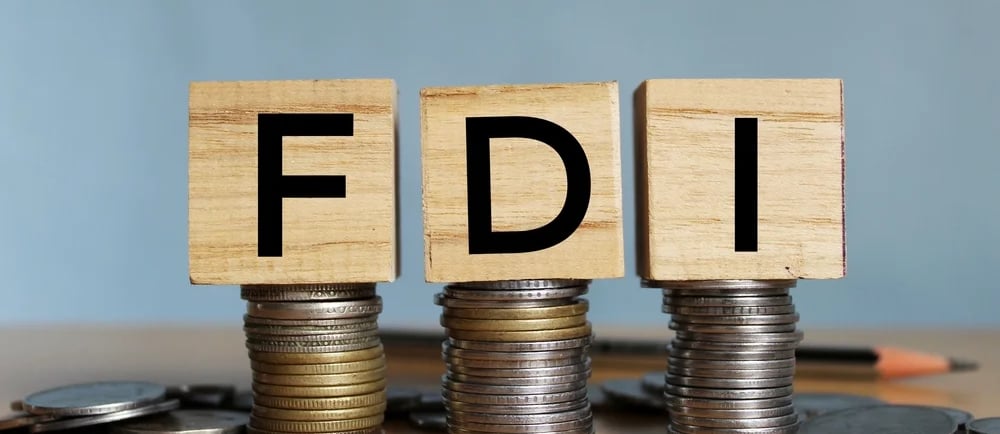From Capital to Construction: The Power of FDI in Real Estate Development
Discover how Foreign Direct Investment (FDI) is transforming the real estate sector, from funding to construction. This blog explores its impact on urban development, sustainability, and economic growth. Learn how FDI is shaping the future of real estate in India.


India's real estate market is changing fast, and foreign investments are a big part of it. More global money is coming in, along with new building methods and eco-friendly practices. So, what draws foreign investors to India? And how is this affecting real estate in the future? Let’s find out.
Foreign Investments in India
Since April 2000, India has brought in over $1 trillion in foreign direct investment (FDI). Real estate is a big winner in this trend. In the first half of this fiscal year, FDI jumped by 26% to reach $42.1 billion. This shows how much global investors like India.
So, why is FDI important for the real estate sector? Here are a few reasons:
It brings in money without adding to the national debt.
It sparks new technologies in construction.
It creates a lot of jobs in related industries.
It improves transparency thanks to rules like RERA (Real Estate Regulation and Development Act).
FDI as a Game Changer in Indian Real Estate Landscape
FDI is not only about money pouring, but it is beyond that; it is transforming the fabric of Indian real estate sector:
1. Mobilizing Funding for Massive Developments
Most Indian developers face the challenge of funding mega projects. Big dreams come true with foreign investment: smart cities, luxury residential buildings, and availability of logistics facilities.
2. Introducing Global Standards for Building
International investors bring with them sophisticated technologies, as well as knowledge in aptitude:
Modular construction and prefabrication for faster, cost-efficient structure
Energy-saving design elements for sustainable urban development
Very exalted architectural design meets the global benchmark of standards
3. Greening Out, Getting Smart and Sustainable
ESG matters are the new flavour of the season, attracting very ample interest in green buildings, smart infrastructure, and renewable energy integration from private investors. Example for this is:
LEED-certified green buildings to lessen the footprint of carbon
Commercial hubs run on solar energy, decreasing energy costs
Waste management solution inside a fully automated residential project
FDI in Real Estate
The main point is that real estate is beneficial for foreign investments, yet, it poses some challenges which laps over these benefits:
Long paperwork processes due to the land acquisition laws delays the projects and results in disputes in the end. There have been instances where land disputes have delayed and eventually stopped a project.
Procedures of obtaining land and building permits take time, making it difficult for a developer to begin a project quickly and efficiently.
Very many aspects of real estate investment are a risk and just as there are other participants in the market, investors too will be at risk.
Also, recent currency depreciation has constrained cash inflows and investments in real estate. Inflation has also limited the rate of development.
However reforms as RERA and even the change to using digital forms of land records tend to increase accountability for real estate income properties or venue that is constructed on it. A lot of more user friendly and faster methods are necessary to keep the investments afloat.
The Emergence of Green Buildings in Future Real Estate Market
The expectation for the Indian real estate sector in the future is that it will be more ecological and environmentally conscious, technological and of international-level standards. Rapid urbanization will lead to a growing demand for ecological and technologically facilitated real estate and with FDI lining up such solutions can be foreseen.
Increase in number of smart cities powered by artificial intelligence-driven urban planning
Inclusion of foreign personnel in programmes related to the development of affordable housing
Sustainable real architecture where available resources are used in an optimum way and through appropriate construction technologies becomes the convention
Foreign Direct Investment has multiple implications rather than just financial inflows and one of those is cushioning. Much as India has gained attention from the global investors, the real estate market is one to watch out for as it is going to be the most vibrant, most competitive in the world. The following years will be based on sustainability, modernization, and improved infrastructure giving hope of a very interesting real estate market for India’s affairs.
This raises a question – is the new phase of enlargement suited to the Indian property builders?
Why Are Investors Interested in India?
India has been rising in global business and innovation. This makes it a hot spot for investors.
It now ranks 40th in the World Competitive Index for 2024, which is up from 43rd in 2021.
In the Global Innovation Index for 2023, India is in 48th place, a big jump from 81st in 2015.
It's the 3rd largest country for greenfield foreign direct investment projects.
India also ranks 2nd for global project finance deals, which have gone up by 64%.
The government’s plans like “Make in India,” easier investment rules, and lower corporate taxes are helping a lot.

